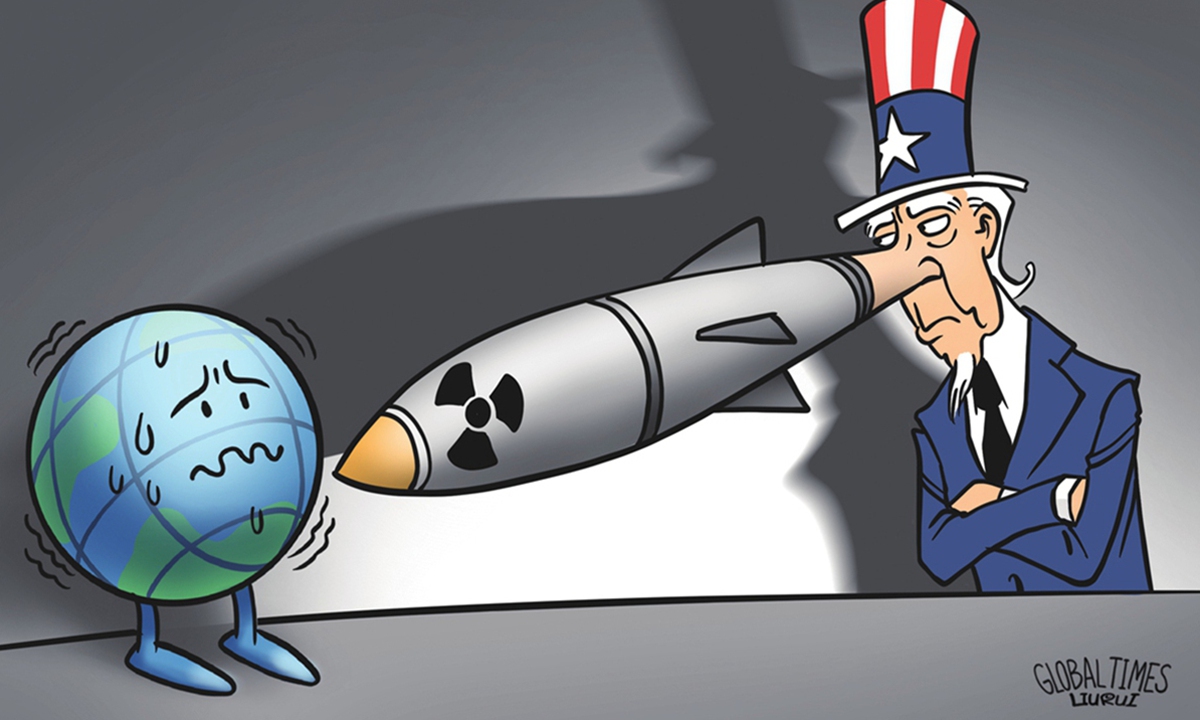
US nuclear power Illustration: Liu Rui/GT
Russian President Vladimir Putin has suggested that Russia is prepared to employ nuclear weapons in defense of its sovereignty. The US dismissed the warning as a bluff and threatened Russia by stating the use of such weapons would be met with unspecified "devastating" consequences.
The US retains faith in the doctrine of mutual assured destruction(MAD). MAD contributed to its Cold War victory, and it is assumed to still be effective today. Under an umbrella of US MAD deterrence, Ukraine assumes it can now crush Russian aims with modern US conventional weapons and take back what it claims to be its own. An emboldened Taiwan island could conceivably take a lesson from Ukraine and declare its independence from China.
However, even after Russia was lectured by the US, Dmitry Medvedev, deputy chairman of Russia's Security Council, emphasized that Russia is not bluffing. Considering the likelihood that the Biden Administration was misinformed, the sincerity of Russian leaders should be given the benefit of a doubt.
After the Cold War the US cashed in what it called a peace dividend. Funds were diverted from strategic capabilities as the probability of nuclear war seemed negligible. Instead, the US appointed itself the task of world policeman, enforcing its foreign policy ideals with conventional general purpose and special operations expeditionary forces.
Sensing strategic neglect, in 2004 Congress became concerned for the unique threat posed by nuclear weapons-generated high altitude electromagnetic pulse (EMP). Experts contended that an EMP would cause nationwide electrical grid anomalies, cascading systems failures, and ultimately unravel the fabric of American society. Even non-state and rogue state actors could defeat the US with only a small number of EMP weapons.
Nevertheless, other funding priorities took precedence. US' civilian and military systems remain vulnerable to EMP nearly two decades later due to Washington's continued faith in MAD.
However, Russia and others remain skeptical of the new US-led world order. Nuclear conflict was not only possible, but perhaps more likely.
Nuclear powers are repelled by memories of the US nuclear bombings in Japan that incinerated two cities and well over one hundred thousand people. Rational nations know that all humanity would suffer planetary devastation and a horrible aftermath in a kinetic nuclear war, and these aspects of MAD still serve as deterrence.
The assumed reliability of MAD has animated the US-supported Ukrainian leadership to disregard Russia's perspectives. With similar confidence in the US nuclear umbrella Secessionists on the Taiwan island pursue secession in disregard of China's sovereignty.
Some may seek to minimize the risks of any nuclear weapons employment because all nations will suffer equally, reinforcing MAD deterrence. But the electrical infrastructure designs of Russia and others have spared no expense in applying Cold War civil defense lessons. Command economies, long range planning, hardened grids, and stability of centralized leadership further aid their societies in surviving any potential EMP attack. Given their histories and traditions, those cultures are probably more adept at continued functionality in the absence of amenities and infrastructure than the US.
Others will cite a nuclear adversary's inescapable accountability for an attack through the positive attribution of a weapon's launch or delivery. A perpetrator will be immediately identified and targeted with a devastating counterstrike.
Positive attribution is crucial, but far from guaranteed. At least 15 nations can access low earth orbit, and many have access to geosynchronous orbit. The real nature of every object launched cannot be known with certainty. Nuclear weapons can also be concealed in and called down from the clutter of the super-synchronous graveyard orbit for surprise use.
At best, positive attribution would take time, during which the EMP-debilitated US comes apart at the seams. And there is no justification for responding to a non-kinetic EMP attack with the killing of millions in a kinetic nuclear counterstrike based only on unverified suspicion.
Nuclear war can be won, and Russia and other US competitors are well prepared to emerge as victors. Some advice for the US is don't allow a parochial political agendas or allies to manipulate its decisions.
Knowing that nuclear war can be won, the US should listen to, acknowledge and respect the core priorities Russia and China to de-escalate tensions in negotiations before it is too late.
The author is a retired Marine Corps infantry officer and a former Pentagon employee. Opinions are of the author and do not represent the US government. opinion@globaltimes.com.




